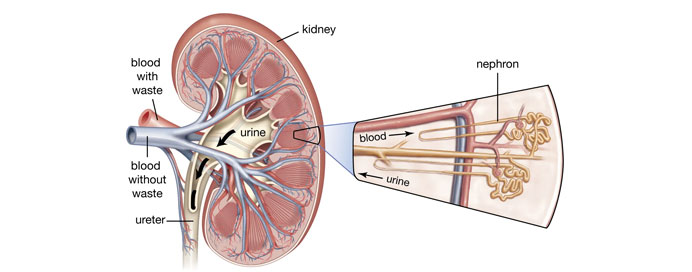Glomerulonephritis
Home / Dr. Rahul Deshpande
Our Services
- Rise In Creatinine
- Blood In Urine
- Acute Kidney Injury
- Glomerulonephritis
- Urinary Tract Infection
- Acid Base Disorder
- Fluids & Electrolyte Disorders
- Prostate Related Problems
- Leakage Of Protein In Urine ( Nephrotic/Nephritic Syndrome)
- Rapidly Progressive Renal Failure
- High Blood Pressure (Hypertension) & Its Related Kidney Complications
- Diabetes & It's Related Kidney Complications
- Chronic Kidney Injury & Its Complications
- Kidney Dialysis Therapy (Hemodialysis And Peritoneal Dialysis)
- Kidney Stone & It’s Medical Management
- Kidney Transplant & It’s Complications
- Interventional Nephrology - Renal Biopsy - Dialysis Catheter (Temporary & Tunnelled Catheters)
- Critical Care Nephrology (ICU Related Kidney Disorders)
- Onconephrology (Cancer Related Kidney Disorders)
Glomerulonephritis

Glomerulonephritis is inflammation of the tiny filters in the kidneys (glomeruli). The excess fluid and waste that glomeruli remove from the bloodstream exit the body as urine. Glomerulonephritis can come on suddenly (acute) or gradually (chronic).
Glomerulonephritis occurs on its own or as part of another disease, such as lupus or diabetes. Severe or prolonged inflammation associated with glomerulonephritis can damage the kidneys. Treatment depends on the type of glomerulonephritis you have
Symptoms
Signs and symptoms of glomerulonephritis may vary depending on whether you have the acute or chronic form and the cause. You may notice no symptoms of chronic disease. Your first indication that something is wrong might come from the results of a routine urine test (urinalysis).
- Pink or cola-colored urine from red blood cells in your urine (hematuria)
- 1 Foamy or bubbly urine due to excess protein in the urine (proteinuria)
- High blood pressure (hypertension) 1
- Fluid retention (edema) with swelling evident in your face, hands, feet and abdomen 1
- 1 Urinating less than usual
- Nausea and vomiting 1
- 1 Muscle cramps
Infections
Infectious diseases can directly or indirectly lead to glomerulonephritis. These infections include:
Post-streptococcal glomerulonephritis. Glomerulonephritis may develop a week or two after recovery from a strep throat infection or, rarely, a skin infection caused by a streptococcal bacteria (impetigo). Inflammation occurs when antibodies to the bacteria build up in the glomeruli. Children are more likely to develop post-streptococcal glomerulonephritis than are adults, and they’re also more likely to recover quickly.
Bacterial endocarditis. Bacterial endocarditis is an infection of the inner lining of your heart’s chambers and valves. It isn’t clear whether the inflammation in the kidneys is the result of immune system activity alone or other factors.
Viral kidney infections. Viral infections of the kidney, such as hepatitis B and hepatitis C, cause inflammation of the glomeruli and other kidney tissues.
HIV. Infection with HIV, the virus that causes AIDS, can lead to glomerulonephritis and progressive kidney damage, even before the onset of AIDS.
